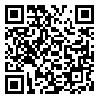Volume 25 - Supplementary
Journal of Translational Medical Research. 2018, 25 - Supplementary: 76-82 |
Back to browse issues page
Download citation:
BibTeX | RIS | EndNote | Medlars | ProCite | Reference Manager | RefWorks
Send citation to:



BibTeX | RIS | EndNote | Medlars | ProCite | Reference Manager | RefWorks
Send citation to:
Raeisoon M R, Mohammadi Y, Amirabadi Zadeh H, Akbari N, Saeedzadeh M. Investigating the relationship between problem solving skills and academic achievement of students of Birjand University of Medical Sciences in 2017. Journals of Birjand University of Medical Sciences 2018; 25 :76-82
URL: http://journal.bums.ac.ir/article-1-2439-en.html
URL: http://journal.bums.ac.ir/article-1-2439-en.html
Mohammad Reza Raeisoon1 

 , Yahya Mohammadi2
, Yahya Mohammadi2 

 , Hassan Amirabadi Zadeh3
, Hassan Amirabadi Zadeh3 

 , Narjes Akbari4
, Narjes Akbari4 

 , Mohammad Saeedzadeh *5
, Mohammad Saeedzadeh *5 




 , Yahya Mohammadi2
, Yahya Mohammadi2 

 , Hassan Amirabadi Zadeh3
, Hassan Amirabadi Zadeh3 

 , Narjes Akbari4
, Narjes Akbari4 

 , Mohammad Saeedzadeh *5
, Mohammad Saeedzadeh *5 


1- Department of Social Medicine, Faculty of Medicine, Birjand University of Medical Sciences, Birjand, Iran & PhD Student of Higher Education Management, Allameh Tabataba’i University, Tehran, Iran & Visiting Professor, Islamic Azad University of Ferdos, Iran
2- EDC Employee, Birjand University of Medical Sciences, Birjand, Iran
3- Faculty of Health, Birjand University of Medical Sciences, Birjand, Iran.
4- Faculty of Dentistry, Birjand University of Medical Sciences, Birjand, Iran.
5- Education Specialist of Ferdows Medical School, Paramedical Sciences, Birjand University of Medical Sciences, Iran. ,mohammad.saeedzadeh@bums.ac.ir
2- EDC Employee, Birjand University of Medical Sciences, Birjand, Iran
3- Faculty of Health, Birjand University of Medical Sciences, Birjand, Iran.
4- Faculty of Dentistry, Birjand University of Medical Sciences, Birjand, Iran.
5- Education Specialist of Ferdows Medical School, Paramedical Sciences, Birjand University of Medical Sciences, Iran. ,
Abstract: (8510 Views)
Background and Aim: Academic achievement is one of the important indicators in the evaluation of higher education system. in this regard, problem-solving skills are among factors influencing students’ academic achievement. the purpose of this study was to determine the relationship between problem-solving skills and academic achievement of students at Birjand University of Medical Sciences.
Materials and Methods: This study is a descriptive-analytic, correlational study in which 342 students studying at Birjand University of Medical Sciences were selected via a stratified random sampling method in the academic year of 2016-17. the data collection tools comprised of a demographics form, Hepner & Petroson Standardized Problem Solving Questionnaire, and students’ total GPA scores as indicators of academic achievement. Data analysis was performed by SPSS18 using descriptive statistics (mean, standard deviation, frequency and percentage), Pearson correlation test, independent t-test, and, analysis of variance.
Results: The majority of participants in this study (58.5%) were girls. Based on Pearson correlation test, there was a significant positive correlation between problem-solving and academic achievement. There was also a statistically significant difference between the students' GPA scores in terms of gender and student's faculty (P <0.001). But the score was not found significant differences between male and female students' problem-solving.
Conclusion: Given the direct relationship between problem-solving and academic achievement of students, it is suggested that teachers put the learner in a position of solving problems rather than forcing them to rote learn concepts, methods, and rules so that they can see themselves in the real scene and face the problem and solve it.
Materials and Methods: This study is a descriptive-analytic, correlational study in which 342 students studying at Birjand University of Medical Sciences were selected via a stratified random sampling method in the academic year of 2016-17. the data collection tools comprised of a demographics form, Hepner & Petroson Standardized Problem Solving Questionnaire, and students’ total GPA scores as indicators of academic achievement. Data analysis was performed by SPSS18 using descriptive statistics (mean, standard deviation, frequency and percentage), Pearson correlation test, independent t-test, and, analysis of variance.
Results: The majority of participants in this study (58.5%) were girls. Based on Pearson correlation test, there was a significant positive correlation between problem-solving and academic achievement. There was also a statistically significant difference between the students' GPA scores in terms of gender and student's faculty (P <0.001). But the score was not found significant differences between male and female students' problem-solving.
Conclusion: Given the direct relationship between problem-solving and academic achievement of students, it is suggested that teachers put the learner in a position of solving problems rather than forcing them to rote learn concepts, methods, and rules so that they can see themselves in the real scene and face the problem and solve it.
Type of Study: Original Article |
Subject:
Medical Education
Received: 2018/01/30 | Accepted: 2018/07/16 | ePublished: 2018/09/5
Received: 2018/01/30 | Accepted: 2018/07/16 | ePublished: 2018/09/5
Send email to the article author
| Rights and permissions | |
 |
This work is licensed under a Creative Commons Attribution-NonCommercial 4.0 International License. |



